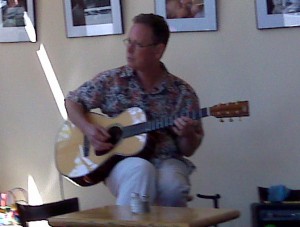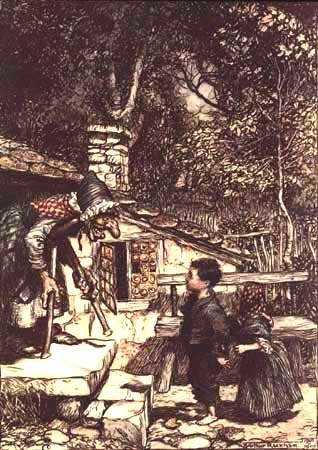First, on a day like today, there’s the walk. Just four breezy blocks beneath a cat-stretch sun and here’s our neighborhood coffee shop — Caffe Destino, where Ralph the Owner has been known to laugh and accuse Mrs. Scatter and me, as we’ve sat facing each other tapping away on dueling laptops, of playing Battleship.
 No computer screens today, though. On most Sunday mornings Destino offers a bonus: Guitarist John Dodge sits on a stool in the corner by the kids’ toys, small amp propped on a chair beside him, and gives the French blend and bagels a musical setting. It’s melodic, and just the right decibel, and a bit Robert Browning-ish in its simple elegance: All’s right with the world.
No computer screens today, though. On most Sunday mornings Destino offers a bonus: Guitarist John Dodge sits on a stool in the corner by the kids’ toys, small amp propped on a chair beside him, and gives the French blend and bagels a musical setting. It’s melodic, and just the right decibel, and a bit Robert Browning-ish in its simple elegance: All’s right with the world.
Destino sits on the corner of Northeast Fremont and 14th in Portland and has big towering windows that let the sun stream in, but today the place is sleepy: The weather’s so good that most people are out and about, not inside anywhere.
“A quiet morning,” Dodge comments, smiling. And then he begins to play Goin’ Home, one of the loveliest melodies in the American songbook. And I think about how this beautiful song, which many people believe is an African American spiritual, is actually the theme from the second movement of Antonin Dvorak’s Symphony No. 9, his Symphony From the New World, which he wrote in 1893, during his four-year stay in the United States. The great Czech composer was fascinated with what he heard of Native American and African American music, and predicted that a new American serious music would be built on the foundation of black music. In a way, he was right: It’s called jazz.
So a Czech composer embedded a song on an American theme into a European-style symphony, and it became one of America’s foremost “folk” tunes, because the nature of American culture, like the English language, is to borrow and adapt from everywhere. Czech, Chinese, West African, Brazilian, Russian, Afghani: Once it arrives here, it’s all part of the mix.
People wander in, often with children, who are a regular part of the Destino blend. A sudden squall at the counter declares an emergency: A young lady has spied a cinnamon roll and it’s become her heart’s desire. Except her dad’s said no. Eventually, reluctantly, she settles on a grilled cheese.
Continue reading Why I like coffee shops on a Sunday morning
 The smashing success of last Friday’s
The smashing success of last Friday’s